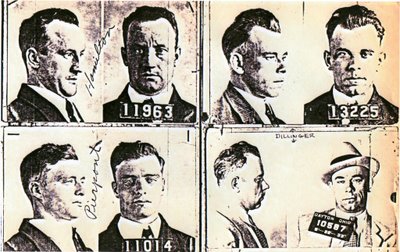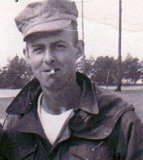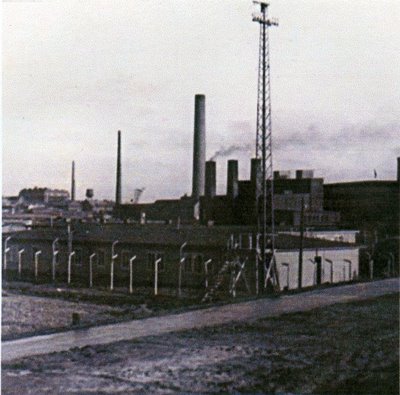Three Outlaws You Wouldn't Have Wanted to Meet
 They were not the kind of men that rob banks today. They didn't walk in clad in scroungy clothes and hand a note to a teller, not the Dillinger Gang. They went in wearing business suits and hats, guns in hand, with Dillinger yelling, "This is a stickup," before vaulting over the barrier into the teller's cages. John Dillinger is shown in the two photos at the right. At the upper left is John Hamilton, a daredevil gunman afraid of no man. Below him is handsome Harry Pierpont, considered by some to be the brains of the gang and known as a vicious killer when aroused. I rescued these mug shots from a stack ready to be thrown away by the police department in Muncie, Indiana. That's cops for you. Men with a real sense of history.
They were not the kind of men that rob banks today. They didn't walk in clad in scroungy clothes and hand a note to a teller, not the Dillinger Gang. They went in wearing business suits and hats, guns in hand, with Dillinger yelling, "This is a stickup," before vaulting over the barrier into the teller's cages. John Dillinger is shown in the two photos at the right. At the upper left is John Hamilton, a daredevil gunman afraid of no man. Below him is handsome Harry Pierpont, considered by some to be the brains of the gang and known as a vicious killer when aroused. I rescued these mug shots from a stack ready to be thrown away by the police department in Muncie, Indiana. That's cops for you. Men with a real sense of history.To be exact, the trio shown were the key men in the second and most notorious Dillinger Gang. For the most part the first gang consisted of Dillinger and Homer Van Meter. Baby Face Nelson was the star of the third gang, but nobody called him Baby Face. Not if they wanted to go on living. He killed at the drop of a hat and put a real dent in the ranks of the FBI.
Dillinger, Pierpont and Hamilton became friends in prison. After Dillinger was set free he was the outside man in one of the biggest prison breaks in history. Pierpont and Hamilton were among the nearly dozen escapees. So were a couple of others in that second Dillinger Gang.
They freely roamed Indiana and Ohio, occasionally other states, in small cars during the daylight hours because the cops thought outlaws traveled at night in big cars. Van Meter no longer was a member of the gang because he liked to clown around and Pierpont, a deadly serious man, wouldn't have him around.
Of their many bank holdups, one of the most lucrative came in Greencastle, Indiana. It also had a humorous twist. While the others were inside, Hamilton stayed on the street by the door to keep anyone from entering or leaving, playing the role of what they called the "Tiger." It didn't work out quite the way they had it planned because an elderly woman of foreign extraction decided to leave. Hamilton stopped her and said she couldn't. She pushed him aside, saying, "I go to Penney's and you go to hell." The flabbergasted Hamilton watched her cross the street to go shopping. What else could he realistically have done on a busy downtown sidewalk?
Dillinger was arrested after a bank job in Bluffton, Ohio and was held in the Allen County Jail in Lima. There was a warrant out for him in Dayton so one evening Pierpont walked in with a second member of the gang and said he was there to return Dillinger to that city. The sheriff himself was on desk duty. He said, "Let's see your credentials." Pierpont pulled a gun from under his jacket, said, "Here's our credentials," and shot the sheriff dead. That later led him to the hot seat in the Ohio State Penitentiary.
In the 1980s I interviewed one of Pierpont's cousins. She was just a little girl when Harry decided to attend a family reunion north of Muncie even though every cop in the country was looking for him. She thought he was nice, but her one real memory of him was his blue eyes, the most vivid she had ever seen. But not eyes you'd want to see when they were staring at you over the barrel of a gun.








